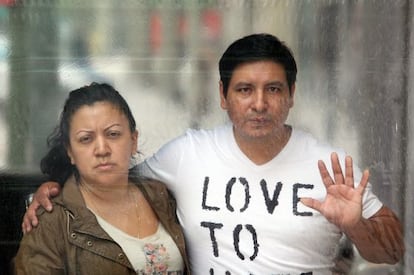Anatomy of a limited law
A government decree was issued last November to help homeowners facing eviction But the measure is an overwhelming failure, according to a new report

A government decree issued last November suspending evictions for two years for vulnerable homeowners who can no longer pay back debt has had little impact, according to a survey carried out by pollster Metroscopia on behalf of EL PAÍS.
The survey showed that fewer than two percent of requests to suspend an eviction have been successful.
The survey blamed the strict criteria established by the government for stopping an eviction, along with unrealistic time frames and red tape, as among the main reasons so few people have been able to hold on to their homes.
"The study shows that the decree has been useless," says Metroscopia researcher Violeta Assiego.
"Furthermore, it dismantles the draft law currently before Congress."
The Senate has already received the draft law from Congress, which applies the same requirements outlined in the November decree to stop an eviction order.
Fewer than two percent of eviction suspension requests have been successful
The weaknesses of the November decree have been exposed as part of a survey of 92 cases at a Madrid court between March 25 and April 12.
A team of three researchers analyzed each case, selected from among the 244 requests for eviction proceedings to be suspended out of a total of 3,446 repossession orders.
Researchers found that just 7.08 percent of cases involved a request to suspend an eviction. Of these, just 16.39 percent were accepted by the judge overseeing the repossession, meaning that barely two percent of evictions have been stopped.
José María Fernández Seijo, a judge in Barcelona, says that figures in Catalonia show that barely five percent of evictions there have been stopped using the decree. Judges in other regions report similar figures.
On November 15, 2012, Prime Minister Mariano Rajoy announced a decree that would allow for evictions to be suspended in cases where the mortgage repayment amounted to more than 50 percent of the debtor's net income; there had been a significant reduction in earnings in the four years prior to the eviction order being brought; where the mortgage applied to the family's only home; and where the debtor's income was less than three times the IPREM (Public Income Index Multiplier), a reference index for calculating the income threshold for subsidies for housing, study grants, unemployment benefit and free legal aid. The decree would also be applied specifically in the case of large families with small children or disabled dependents, as well as women who had suffered domestic violence.
"In practice, we see that only those capable of solving the Sudoku of requirements have been able to stop an eviction," says Ramón Palomino, one of the researchers.
Some couples have even had a child in a desperate bid to meet the requirements"
The survey also points out that the time frames outlined in the decree are unrealistic. The decree calls for evictions to be halted for a period of two years. Most evictions take between two and five years to carry out, meaning that no procedure begun after the decree becomes law has any chance of using the law.
The draft law now before the Senate also requires banks to wait three months, and not the current one month, after the first failure to make a mortgage repayment, before beginning proceedings. The survey shows that banks usually wait up to 10 months before trying to repossess a property.
The survey demonstrates that in reality, action is only begun to stop an eviction order once the debtor has already lost their home. "Any intervention has to take place at the beginning of proceedings," says Violeta Assiego.
The survey was carried out on the condition of anonymity of those whose properties were being repossessed, but tells the stories of many people who did not meet the requirements of the decree to save their homes. These include a woman who lived with her daughter and three-year-old grandson who was denied a suspension of her eviction because the court ruled that her home was in effect two family units; an unmarried couple, both unemployed and no longer in receipt of benefits, with young children, but whose partnership was not registered; or the case of a home with three unemployed adults who could not prove their benefits had run out because they had never received any.
"The requirements mean that a couple earning 1,500 euros a month that has a small child is eligible, but a couple with similar earnings and two children aged above four, are not," says Marisa Muñoz of the Mortgage Victims Platform - the nationwide body set up to protect families in danger of losing their homes.
"Some couples, in a desperate bid to meet the requirements, have even had a child; they have even agreed to accuse the male partner of committing domestic abuse; anything to avoid losing the roof over their head and their children."
It isn't hard to find real life cases. María, from the Dominican Republic, is a 47-year-old mother of a 15-year-old with cerebral palsy who is trying to save her home.
Her only income is a government emergency payment of 426 euros that runs out on May 10. Last week, a Madrid court gave her 10 days to present more paperwork. "Things are terrible," she says. "I am a single mother, I have no money. I have nowhere to go, but what worries me most is my child."
Around 70 percent of those facing eviction orders are non-Spaniards, says the report, and of them, 87 percent are from Latin America.
Carlos Napoleón Amancha Silva, a 36-year-old Ecuadorian father-of-two who came to Spain 13 years ago, has been unemployed for the last 18 months. He is also living on the government's bottom-line payment of 426 euros.
He says he was initially hopeful that the November 2012 decree would help him save his home. He filled in the paperwork, but was ruled ineligible because his income was deemed too high.
His home in the Madrid dormitory town of Getafe has already been auctioned off. He now owes the bank 220,000 euros. "The two-year moratorium is of no use at all," he says, "because the debt hasn't been cancelled. I need the debt to be cancelled, now that the bank has repossessed my property and sold it."
Amancha, whose wife is working, says he feels tricked by the banks. This week he is due to make a final bid to prevent being made homeless: his eviction is due in July.
Tu suscripción se está usando en otro dispositivo
¿Quieres añadir otro usuario a tu suscripción?
Si continúas leyendo en este dispositivo, no se podrá leer en el otro.
FlechaTu suscripción se está usando en otro dispositivo y solo puedes acceder a EL PAÍS desde un dispositivo a la vez.
Si quieres compartir tu cuenta, cambia tu suscripción a la modalidad Premium, así podrás añadir otro usuario. Cada uno accederá con su propia cuenta de email, lo que os permitirá personalizar vuestra experiencia en EL PAÍS.
¿Tienes una suscripción de empresa? Accede aquí para contratar más cuentas.
En el caso de no saber quién está usando tu cuenta, te recomendamos cambiar tu contraseña aquí.
Si decides continuar compartiendo tu cuenta, este mensaje se mostrará en tu dispositivo y en el de la otra persona que está usando tu cuenta de forma indefinida, afectando a tu experiencia de lectura. Puedes consultar aquí los términos y condiciones de la suscripción digital.









































